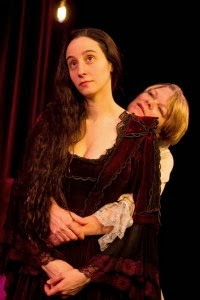234.
THE SHAPE OF SOMETHING SQUASHED
Tom
Noonan, an interesting actor I first saw in Sam Shepard’s BURIED CHILD in 1978,
is an imposing figure, 6 feet 7 inches tall. His presence dominates THE SHAPE
OF SOMETHING SQUASHED, which he also wrote and directed, and is made even more
distinct by the dyed black hair and bushy mustache he wears. For some reason,
neither he nor his role are listed in the rather amateurishly printed program
provided for the play (which spells the character name Hermione as Hermoine). The
four-character drama is being shown at Paradise Factory, an East 4th Street
venue down the block from La Mama and across from the New York Theatre
Workshop. Reportedly, the place has undergone a multimillion dollar renovation
before reopening for business with this production. Mr. Noonan seems to be the
proprietor, as in references to Tom Noonan’s Paradise Factory.
From left: Tom Noonan, Monique Vukovic, Grand James Varjas, Talia Lugacy. Photo: Jim Chow.
There’s nothing particularly noteworthy
about the theatre, it being a small, black box with variable seating, in this
case arranged in a three-quarter round configuration. The locale for the play
is backstage at an Off Off Broadway theatre, presumably one like the Paradise
Factory itself. For a set, there are curtains along the back wall, a divan, and
two round ottomans. No designer is credited.
Talia Lugacy, Monique Vukovic. Photo: Jim Chow.
The
characters are all theatre people, and the premise is that they are hoping to
present a producer’s reading of a new work by Sedge (Grant James Varjas), the
theatre’s eccentric, self-involved artistic director; his company’s life or
death depend on the success of the reading. The company star is Hermione
(Monique Vukovic), a diminutive actress in early middle age, with pixie-like
features and short, blonde hair. Another character is the heavily accented Mona
(Talia Lugacy), from Uzbekistan (I think), whose long, wavy hair is constantly
referenced in the dialogue. Like Sedge and Hermione, she wears a Renaissance-style
costume; her name, given to her by Sedge, is a tribute to her resemblance to
Mona Lisa. She’s something of a servant-intern-sex slave (which she denies), doing
everything needed around the theatre, including keeping a verbatim record of
whatever anyone says (although we never see her do this), in hopes of getting a
green card. She fears for her life if she returns to her native country. Into
this mélange comes Douglas Whymper (Mr. Noonan), a hapless, has-been actor-musician,
wearing a black, pin-striped suit and, instead of a shirt and tie, a sort of
scarf tucked under his jacket. The costumes are by Kathryn Nixon.
A
famous actor, Sir Oliver, is supposed to participate in the reading, which is
aimed at a pair of Toronto producers, but he may not be able to do so; he hates
Hermione, it seems. Hermione refuses to read with anyone else. Eventually, Douglas
is allowed to audition to replace Oliver. Up till now he’s been treated disparagingly by everyone
as if he’s there as a chauffeur or “driver,” and no one ever allows him to explain his presence. When he finally reveals that he’s an actor,
and is given a chance to read, he somehow already knows all the lines. This
angers Hermione, who blames him for showing her up. She finds him unimpressive,
inspiring her to give an impassioned speech about what it takes to be a real
actor and how she hates all mediocre actors and doesn’t believe in
doing anything to help them; only Mona is upset by this outburst of artistic selfishness. Douglas gets another chance, however, and this time
allows all his feelings to come out, which awes everybody so much that he’s
allowed to read for the producers. But then Sir Oliver changes his mind, and Douglas
is overlooked again. Such, after all, is life in the theatre.
The
production has an odd, snail-paced aura that deprives it of any sense of
reality. It’s very hard to get caught up in any of the plot’s machinations or
to believe in any of the characters, although the actors all are professionally
qualified. Oddest of all is Mr. Noonan, who plays his role (which also allows
him to perform at a keyboard) with a kind of hangdog shyness and hesitancy; he
speaks and reacts with tentative half smiles, starts, and stops that reveal he’s
clearly not the driver he’s mistaken for; he simply hasn’t the gumption to say
who he is. This approach grows increasingly monotonous
and uninteresting in both the writing and the acting. As it is, Douglas is not merely an actor, but a composer-writer who
created a one-man musical about Friedrich Nietzsche. (For more on Nietzsche on
stage, see my review of PHILOSOPHY FOR GANGSTERS.) Perhaps that explains the mustache, at any rate. I'm not sure it explains anything else.
Mr.
Noonan’s relentlessly tedious play began to make me feel uncomfortable even
before the intermission arrived. By the time it ended, after two hours of sitting on an uncomfortable chair, I myself
felt very much like something squashed.



